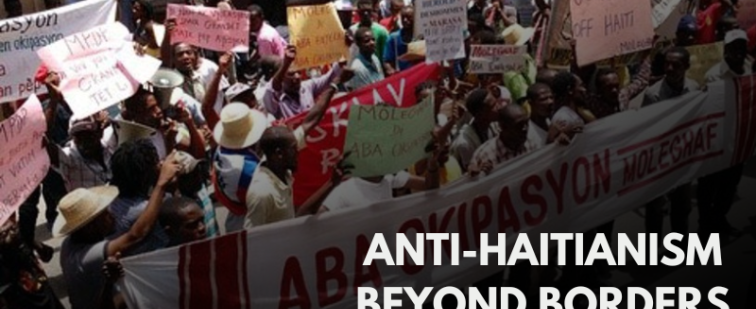Home
Border Wars
June 28, 2011
This past Sunday, Pulitzer Prize-winning journalist Jose Antonio Vargas "outed" himself as an "illegal alien" in the pages of The New York Times Magazine. The reaction of many in the media establishment has been to dwell on Vargas's practices of deception that allowed him to "pass" for so long. In doing so, these pundits obscure and normalize the apartheid-like system which denies unauthorized immigrants many basic rights, and their complicity in its perpetuation.
Mexico, Bewildered and Contested
June 28, 2011
Last Thursday, President Felipe Calderón held a highly publicized encounter with several victims of the extreme violence that has accompanied his ongoing war against drug trafficking and organized crime. The victims didn’t succeed in getting Calderón to apologize for the inordinate number of deaths and disappearances that have occurred on his drug-war watch, but they did get the president to listen to tales of immense suffering.
Cuadernos Colombianos
June 26, 2011
Over the last decade, several changes occurred in the political economy of the war system in Colombia that may lead to the prolongation of the civil conflict.
June 24, 2011
By Deborah Poole and Gerardo Renique
On June 5, Peruvian voters handed a hard won presidential victory to the progressive nationalist, Ollanta Humala. While it is too early to predict the future of the Humala government, his victory has dealt an important blow to both the Peruvian right and U.S. interests in Latin America.
Traffick Jam
June 22, 2011
Over the last decade the Caribbean has become one of the major trafficking routes for drugs leaving South America destined for the United States and other consumer markets. The twin island nation of Trinidad and Tobago (T & T), a place I am currently visiting for the first time, presents a sobering case study on the failures of the punitive approach to drug control advocated and funded by the United States.
June 22, 2011
On June 5, Peruvian voters handed a hard won presidential victory to the progressive nationalist, Ollanta Humala. While it is too early to predict the future of the Humala government, his victory has dealt an important blow to both the Peruvian right and U.S. interests in Latin America.
Border Wars
June 22, 2011
There have been different responses to increased immigration over the Arizona-Mexico border on the Tohono O'odham Nation. One has been the dramatic increase of federal immigration enforcement agents and technology on the Nation. The other has been an attempt to put water along migrant routes, in attempt to stop migrant deaths. All of this has taken place on a Native American reservation, whose aboriginal land has been divided by the U.S.-Mexico border.
Mexico, Bewildered and Contested
June 21, 2011
Central American migrants are the most vulnerable of the vulnerable. Their resources are few and once they leave home they have no legal rights. Crossing Mexico, they are routinely held captive and extorted, not only by criminal gangs, but by unscrupulous public officials, private guards, transporters and even their own guides as they make their way northward. Sometimes, they simply disappear—not infrequently into enforced prostitution or perhaps into common graves.
Cuadernos Colombianos
June 20, 2011
For almost a century the dominant classes of Colombia have refused to accept a meaningful land reform as a way to end the civil war. What the Santos government needs is a change of course based on the acknowledgment that this protracted war has damaged enough Colombia’s social fabric.
Rebel Currents
June 17, 2011
Over the past 40 years, Bolivia has experienced an average of one “social conflict” per day, according to a recent report that measures episodes of conflict reported in the press. Underlying these statistics is the defining role played by Bolivia’s social movements—arguably the most powerful and combative in the hemisphere—in the country’s political history.












